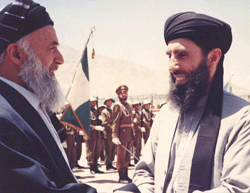Hezb-e-Islami is back, green flag and all. The most radical and powerful of Afghanistan’s Islamic movements is an officially recognised political party which now claims to be one of the largest blocs in parliament.
Party leaders say they are poised to sweep to power in future elections now that they are able to campaign openly.
They also say that they have broken ties with the man most closely identified with Hezb-e-Islami, its founder Gulbuddin Hekmatyar, whom the United States lists as a wanted terrorist.
Many political analysts, however, are sceptical of the party’s claim that it has reformed.
Hekmatyar, one of the major commanders in the resistance to the Soviet occupation of the Eighties, is an unrepentant mujahedin. He has called repeatedly for a new holy war against the foreign occupiers and those who cooperate with them - including the current Afghan government.
He has publicly vowed that his supporters will never join the present regime.
“Hekmatyar’s policies are his own personal position. He does not represent Hezb-e-Islami,” said Sayed Rahman Wahedyar, a member of the faction in Kabul. “We have cut all ties with Hekmatyar.”

RAWA: Two criminal Afghan fundamentalist "leaders", Burhanuddin Rabbani (L) and Gulbaddin Hekmatyar (R). The US government regards Hekmatyar a wanted terrorist but supports Rabbani and his men! Why? Because Rabbani is pro-US terrorist and Gulbaddin is anti-US terrorist!
According to Wahedyar, the current Hezb-e-Islami party supports the ongoing peace process in the country, and even tolerates the presence of foreign troops, viewing them as necessary in the currently unstable security environment.
Wahedyar added that member of parliament Khalid Farooqi, a powerful Hezb-e-Islami commander in Paktika province during the mujahedin years, had been named as the party’s new leader.
But the new-look Hezb-e-Islami does not appear to have deviated far from its fundamentalist roots.
The feeling at party headquarters is decidedly conservative. Everyone is dressed in the traditional pirhan-tunbon, the loose shirt and flowing trouser that constitutes Afghan national dress. Most sport the pakul, the soft round hat that became a symbol of mujahedin resistance. And the vast majority wear long beards like those favoured by the Taliban and by Hekmatyar himself.
As a result of last September’s parliamentary election, Hezb-e-Islami has 34 members in the lower house of parliament, making it one of the largest groups in the 249-member body, according to Wahedyar.
Given Afghanistan’s chaotic political landscape, with 81 parties now registered and several more in the works, this represents a significant achievement. Wahedyar says the party would have been even more successful if it had been allowed to register earlier.
“The justice ministry did not want to let Hezb-e-Islami conduct political activities,” said Wahedyar. “They wanted us to change our name and flag. But we resisted.”
It took repeated negotiations with President Hamed Karzai, and one-and-a-half years, to overcome the government’s reluctance to see the symbols of Hekmatyar’s once-formidable power officially displayed.
“This was all engineered by our opponents, who are part of the current government,” said Wahedyar.
Hekmatyar has a host of enemies among those now in power. He engaged in a vicious civil war with many of them after the collapse of communist rule in 1992, when mujahedin commanders destroyed Kabul and much of the rest of the country in a fierce power struggle. He was twice prime minister between 1992 and 1996, although the shifting alliances and violent conflict made his appointment notional.
When the Taliban came to power in 1996, Hekmatyar went into exile in Iran, where he continued to run Hezb-e-Islami.
His outspoken condemnation of the invasion of Afghanistan and of the interim government established in the wake of the September 2001 attacks on the US got him expelled from Iran and earned him a place on the list of terrorists most wanted by the American government. In 2002, the CIA reportedly tried to assassinate him.
Hekmatyar is currently in hiding. Observers say he continues to have broad popular support, especially in the Pashtun-dominated south. An ethnic Pashtun himself, he appeals to many who want to see a strongly Islamic state established in Afghanistan, and who condemn what they see as the corrupting influence of the West.
His supporters say he has been unfairly excluded from power. They point to other former mujahedin leaders and militia commanders who have been accepted into the new government, and ask why Hekmatyar’s alleged crimes are deemed worse than those ascribed to General Abdul Rashid Dostum, the former strongman of the north who is now chief of staff of the armed forces, or of Ismail Khan, who ruled the western province of Herat with an iron hand until being made energy minister in December 2004.
Abdul Gheyas Eleyasi, head of the political parties department at the justice ministry, acknowledged that officials were initially reluctant to grant Hezb-e-Islami an official license.
“We registered them only after we received confirmation from the ministries of defence and the interior, as well as the security organs and UNAMA [the United Nations Assistance Mission in Afghanistan] that the party no longer had links with Hekmatyar,” said Eleyasi.
But many suspect that Hekmatyar still running the show.
“Hekmatyar has played many such games and he has always won them,” said political analyst Fazul Rahman Orya. “Hezb-e-Islami is certainly here with Hekmatyar’s agreement. They are behaving according to Hekmatyar’s wishes, so as to accomplish his goals.”



